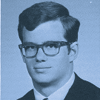Robert Snowden Waples, Jr. – 50th Reunion Essay
Robert Snowden Waples, Jr.
 7318 23rd Ave NW
7318 23rd Ave NW
Seattle, WA 98117
robin.waples@noaa.gov
206-789-4648
Spouse(s): Paula Jenson (1980)
Child(ren): Ryan (1982); Jade (1985)
Grandchild(ren): Sonora (2016)
Education: Scripps Institution of Oceanography, PhD 1986 Marine Biology
Career: Various jobs and travels (1969–1979); PhD (1979–1986); Research scientist (1986–present)
Avocations: Travel; biking; beer and wine making
College: Berkeley
Two contrasting, intertwined themes: agency and chance. Although Marcuse argued that some apparent freedoms are illusory, we nevertheless can be masters of our fate. I majored in American Studies, not as part of any Grand Plan—I didn’t have one—but because it allowed me to take interesting courses, from the likes of Vin Scully, Charles Reich, Robert Brustein, Erich Segal, Margaret Mead. In June 1969 I was in Honolulu, teaching English and coaching water polo at Punahou School. Had I stayed longer, a young Barry Obama might have turned up in my class. But I drifted to the outer islands, taking restaurant jobs so I could spend days in and under the ocean. Subsequent travels included several years in Australia, mostly diving on the Great Barrier Reef. I became interested in marine biology, but the lack of any sciences courses since high school except Astronomy 10 was an impediment. So, I returned to Honolulu, spent two years taking undergraduate science courses, and eventually got my PhD at Jack Benny’s terminal age. Surprisingly, I found that many others were similarly reinventing themselves—something I consider a real strength of the US. In most other countries, if you want to be a professional, you have to start early with single-minded focus; if you miss the train or get off, there are few opportunities to reboard.
Serendipity plays a larger role in our lives than we generally acknowledge. At UH I was assigned an advisor who had recently received his PhD in genetics at Yale. I asked about summer employment. There was no job, but if I volunteered he would teach me protein electrophoresis, which for several decades was the primary tool for studying genetic variation in natural populations. I found and eventually described several cryptic fish species that the world’s best ichthyologists couldn’t distinguish. This hooked me on the power of genetics, and I have spent the last 40 years applying evolutionary principles to practical problems in conservation and management.
Regrets? A few. Ten-page papers were standard in many Yale courses I took. Early on I learned how to string three key concepts together well enough for a High Pass, occasionally an Honors. But none of these efforts were noteworthy. Charles Reich offered to help me make my term paper a rigorous piece of work; I didn’t take him up on the offer, but should have. One day Mike Kenfield, a roommate and biology major, came back raving about a course dealing with something called “ecology.” I had never heard of it, but before long it was a household word. I missed the opportunity to learn ecology from G. Evelyn Hutchinson, who invented the discipline at Yale.
Favorite Eli serendip moment: After nine months backpacking in Africa and Asia, in August 1972 I found myself in a small tavern somewhere in Greece. A small TV was showing the Munich games. I looked up to see Frank Shorter run into Olympiastadion to claim the gold medal in the marathon.
If the above is blank, no 50th reunion essay was submitted.
